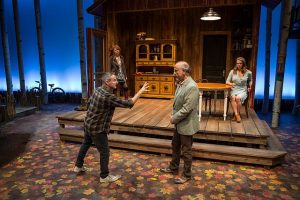RECOMMENDED
In Lookingglass Theatre’s show bill, Aaron Posner explains that ‘Life Sucks” is his updated version of Anton Chekhov’s ‘Uncle Vanya.’

Chekhov’s classic tale, published in 1897 and premiered in 1899, is about life on a rural estate where inhabitants work hard but are bored and their thoughts are a mix of wishes and woes.
That is until The Professor, its absentee owner, appears with an attractive, young wife and wants to sell the place to cover financial losses and also cover his current lifestyle. Complicating matters, two of Chekhov’s characters fall in love with the young wife.
Calling his play a “variation on a theme,” Posner says the play engages in “an active, living conversation.” And that it does.
The audience is drawn in to physical and philosophical conflicts by Lookingglass’ skillful cast: Jim Ortlieb (The Professor), Chaon Cross (professor’s current wife Ella), Eddie Jemison (Vanya) the brother of the professor’s late wife who works the estate with the professor’s daughter by his first wife, Danielle Zuckerman (Sonia), Philp R. Smith (Dr. Aster), a local doctor who Sonia secretly loves, Barbara A. Robertson (Babs), a friend of the family and a leavening influence, Penelope Walker (Pickles) a family friend who brings a current social issue to bear about love.
Rather than just watching the action the audience is encouraged to respond to questions and even a show of hands posed by cast members.
The basic premises are still Chekhovian about hopes, heartbreaks, love and what might be expected of life. But Posner uses his play to get the audience thinking about their own situations as cast members plead their case with witty, humorous dialogue.
A problem with this updated version is that the original issue of selling the estate is not brought into play until late in the show. There is not enough tension trying to figure out why the professor and young wife have appeared and what might be the consequence.
When all is revealed it comes as an unlikely surprise with unlikely results yet engenders little debate about the what-now question.
The play’s message appears to be “move on” because impetus comes from within, not outside forces. However, at issue is when a long-held job or an estate, in this case, might all of a sudden disappear then how does a person move beyond despair. Also, when someone craves to be loved, how does that person move on.
By the end, the characters basically say, hey, we all have problems. Except Babs who shows empathy throughout but advises “you’ve really got to get it together.”
Thought provoking questions and humorous situations and responses work well in Act I. But the naval gazing and continual pulling in of the audience feels somewhat overdone in Act II. This is a play where audience responses and reactions could be invited in a post performance discussion.
Chekhov observations aside, Posner serves up a delicious meal of word-play in an existential-style vehicle of unexpected twists that ends with the cast asking the audience do you think life sucks?
“Life Sucks’ by Aaron Posner, directed by Andrew White, is at Lookingglass Theatre in the Chicago Water Tower Waterworks, 821 N Michigan Ave, Chicago, IL 60611 now through Nov. 6, 2016. For tickets and other information call (312) 337-0665 and visit Lookingglass.
